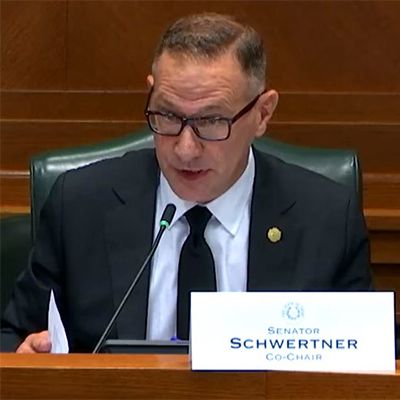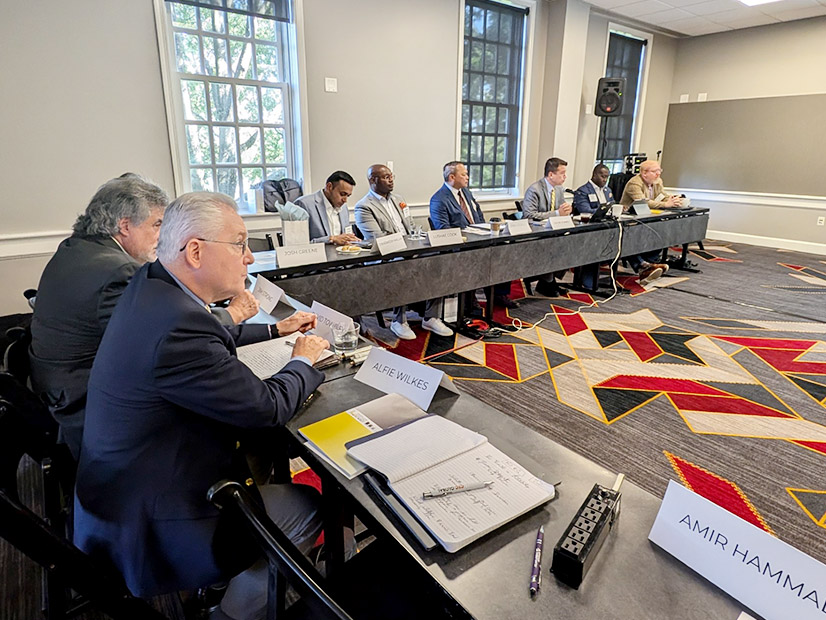A Brattle Group study comparing key features of CAISO’s Extended Day-Ahead Market and SPP’s Markets+ contains “several material misstatements of facts” and overlooks evidence “directly contrary to its conclusions,” Powerex contends in an Oct. 7 brief criticizing the study.
The brief from the energy trading arm of Canada-based BC Hydro comes in response to a white paper Brattle published Oct. 1 that sets out a point-by-point comparison of seven design features of the EDAM and Markets+, including transmission optimization, fast-start pricing, real-time unit commitment (RTUC), procurement of imbalance and flexibility reserves, seams optimization, greenhouse gas pricing and congestion revenue allocation. (See Brattle Study Likely to Fuel Debate over EDAM, Markets+.)
All those features have figured prominently in the often-contentious debate between supporters of each market, which increasingly is playing out in various back-and-forth studies and presentations, as well as a series of “issue alerts” published by a core group of Markets+ funders — which includes Powerex.
Fast-start Conflict
In its brief, Powerex contends “the failure of the Brattle paper to provide a credible and fact-based examination of the market design differences is clearly evident in its discussion of fast-start pricing [FSP].”
While Markets+ supporters argue that FSP is an important benefit of the SPP market that’s conspicuously absent from CAISO’s markets, the Brattle paper played down the importance of the mechanism, saying evidence from several RTOs in the East — including SPP — shows FSP has minimal impact on market prices or revenues for fast-start resources.
Brattle questioned the viability of a 2022 study conducted by consulting firm Energy GPS for Powerex and the Portland, Ore.-based Public Power Council (PPC), which analyzed potential impacts on CAISO markets if the ISO were to implement FSP.
In his initial reaction to the Brattle study, Jeff Spires, director of power at Powerex, told RTO Insider that Brattle misrepresented the results of Energy GPS’ analysis and failed to include the most recent data from the Eastern RTOs showing the benefits of FSP.
The Powerex brief builds on Spires’ points, for example asking why Brattle chose to present MISO’s FSP analysis from 2015 and 2016 when more recent data are available online.
“This is a glaring omission, as later reports paint a very different picture,” Powerex wrote. “In 2021, the MISO Independent Market Monitor explained that while the initial effect of fast-start pricing was very small (when fast-start pricing was a new market design feature), MISO subsequently made important changes to how it applies fast-start pricing that ‘have significantly improved real-time price formation in MISO,’” according to the Monitor’s 2021 State of the Market report.
Powerex said MISO data show that, from 2020 to 2023, the overall price impact from FSP was 50 to 100 times the 1- to 3-cents/MWh estimates for 2015 and 2016 cited by Brattle.
The brief said Brattle’s study also omitted evidence that, in recent years, FSP in PJM added an average of $4/MWh to $8/MWh to the RTO’s prices during morning and evening demand peaks.
Powerex also said Brattle “briefly acknowledges” that New England system prices increased by 11% when ISO-NE implemented FSP, but at the same time cautions the analysis identifying that increase was “limited to the first eight months after FSP came into effect.”
“Brattle could easily have reviewed the annual reports for [ISO-NE] published since then,” Powerex wrote, citing the ISO-NE Internal Market Monitor’s conclusion in its 2023 Annual Markets Report that “fast-start pricing rules in the real-time energy market continue to have notable impacts on pricing and market costs.”
Powerex also castigates Brattle for saying Energy GPS’ 2022 analysis suggested FSP would have had an average price impact of $15/MWh to $23/MWh on CAISO’s market over 2017-2020 if the ISO had implemented the practice.
“In fact, the [Energy GPS] report clearly states that ‘for the evening peak hour from 6 p.m. and 7 p.m., this price impact averaged nearly $15/MWh in NP15, and nearly $23/MWh in SP15,’” Powerex wrote, referring to trading hubs on the CAISO system. “The Brattle paper takes the price impact of the single-highest hour and presents it as the price impact across all hours, which is simply false.”
John Tsoukalis, a principal at Brattle and the lead author of the study, said his group “will take a close look at and consider the additional evidence [Powerex] put forward on fast-start pricing, but we note that the fast-start pricing section of our white paper is based on the analyses conducted by market monitors in other regions.
“For example, SPP’s [Market Monitoring Unit] stated in May 2022 that ‘there was very little change in the revenues to fast-start units due to the new fast-start pricing. The fast-start pricing appeared to have created [a] 1.5% increase in day-ahead revenues to fast-start resources and a 0.5% increase in real-time revenues. All else equal, the increase in revenue would cause a negligible reduction in make-whole payments,’” Tsoukalis said in an email.
CAISO and FSP
The Powerex brief also calls out CAISO for being the only FERC-jurisdictional organized electricity market without fast-start pricing.
The company explains that in markets with FSP, “special pricing logic” is applied to ensure the cost of starting and operating fast-start units is allowed to set the market’s LMPs when those units are determined to be providing supply at the market’s margin. In markets without FSP, the LMP can remain “well below” the cost of running peakers and “artificially” depress wholesale prices, reducing the amount paid to local generators and imported electricity from neighboring balancing authority areas.
“Avoiding the adoption of fast-start pricing therefore largely benefits utilities (and their ratepayers) in jurisdictions like California that typically import electricity during the hours of the day that gas peaking units are frequently used, while harming suppliers (and their ratepayers) in jurisdictions that typically export electricity during those same hours,” Powerex wrote.
Powerex pointed out that CAISO opposed a 2016 FERC proposal that would have required all organized markets to adopt FSP and that the ISO’s Department of Market Monitoring intervened to oppose adoption of FSP in any market.
“Such opposition aligns with California’s own interests, since the state has historically been a large importer of electricity from both Northwest and Southwest utilities in those hours that gas peakers are running,” Powerex wrote.
Reached for comment on Powerex’s contentions, CAISO pointed out that its Price Formation Enhancements (PFE) Working Group is exploring the potential for implementing FSP in the ISO’s markets.
“We recognize this feature has been adopted in other markets, with each carefully considering integration into its existing design. Different design features of fast-start pricing have tradeoffs that need to be considered by the stakeholders, and in particular, compatibility with existing features of the ISO market design that were specifically developed to compensate flexible and responsive resources with much the same goal as fast-start pricing,” the ISO said in an email.
Still, CAISO said its own analysis, presented to the PFE in April, showed a “minimal $0/MWh impact of fast-start pricing in the Northwest with similar minimal impacts in the Southwest, the exception being very narrow stressed system conditions under which the price impact was small in the CAISO and some specific areas of the Southwest ranging from $2 to $8/MWh depending on the sensitivity.”
Other Features
While the brunt of Powerex’s response dealt with FSP, the company also briefly contested the Brattle paper’s assessment of other market features, including GHG pricing mechanisms, congestion revenue allocation and transmission optimization.
Regarding the last feature, Powerex says the Brattle paper incorrectly asserts that “some stakeholders” — that is, Markets+ supporters — have suggested the market would rely “solely” on flow-based optimization of transmission within its territory, while EDAM would rely on both flow-based and contract path-based optimization.
Powerex said it recognizes that both markets will need to apply contract path limits for rights on transmission located within the boundaries of one market but used in another market.
“But the actual distinction that has been pointed out is that in EDAM, the California ISO will also apply contract-path limits to EDAM transfers between balancing areas participating in the EDAM, just as it applies contract-path limits for [Western Energy Imbalance Market] transfers between entities in the EIM,” it said. “In contrast, Markets+ will limit transfers between balancing areas participating in Markets+ based on physical flow-based limits, enabling more efficient use of the transmission system.”

